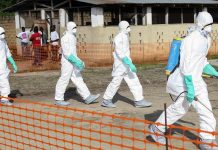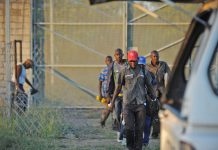Just over a month ago, Africa experienced its first cases of the novel coronavirus, COVID-19. Egypt reported the first case on the Continent, while Nigeria confirmed the first in subSaharan Africa. As of Friday morning, Egypt had 456 confirmed cases and 21 deaths. Nigeria now has over 60 known cases and recently reported its first fatality. Mirroring Europe, the Middle East, Asia and most countries in Africa, including Nigeria, is going into lockdown and faces school closures amongst other measures.
West Africa, in addition to many other parts of the Continent, is ill-equipped to deal with the escalating virus coming its way. Public health systems are weak or non-existent, and variously backed by UN or WHO programmes that will find themselves increasingly spread out in the coming months. Ethiopia’s Prime Minister and Nobel Peace Prize Laureate wrote in the FT that ‘If Covid-19 is not beaten in Africa it will return to haunt us all’. As correct as he is, I add that if countering terrorism is not prioritised in Africa, post-pandemic attacks could haunt us all.
The countries bordering the Sahara desert, known collectively as the Sahel, have spent exhausting years struggling to push back a resurgent ISIS that claimed over 1300 lives last year in Northern Nigeria alone, and are now controlling the Chad border region. Furthermore, the warning of a coming apocalypse in West Africa has been made by the USled commanders on the frontline of the pushback. The security focus of African governments will surely reduce their ability to cope with a virus outbreak of the likes seen in Europe.
West Africa might become the epicentre for a different kind of ‘virus’ which also has the potential to spread to Europe and other parts of the globe. Major John House, who leads the British element of a training programme in Senegal with the focus on infantry skills and counter-terrorism operations, said: “If [the international community] don’t act we may find the problems getting closer to our door…The more [West African terrorist organisations] have a presence in the region, the more we can feel the effect back in the UK.”
US Major Chris Giaquinto, from US Special Operations Command Africa, said the extremists “want to create a safe haven in Africa in order to grow and facilitate attacks, possibly in Europe or the United States”. Islamic State and al-Qaeda are now known to be operating across the sub-Saharan region, and command a West African faction called ISWAP (Islamic State West Africa Province).Commander Djibril Diawara, of the Senegalese Armed Forces, described the situation as “alarming”.
I ask you to now imagine what a deadly virus - that has ended the lives of thousands in peaceful Europe - might do to an African region already at war with an emerging Islamist proto-caliphate.
As critical to solving the health crisis West Africa faces, beyond the battle of medicine and of physical concerns, is the battle of minds. Nigerians in particularly are in a battle over ideology, over the future vision of their society, and to secure sovereignty and freedom from an invading force.
Unlike a virus, which does not distinguish between us, at the cornerstone of ISIS ideology is the principle of kafir, the unbeliever, of which in Nigeria, Christians form a large part along with some sectors of the Muslim community. For too long both Britain and Nigeria have ignored, sometimes wilfully, this silent slaughter which threatens a genocide that could exceed Rwandan proportions.
There appeared to be rays of hope recently with the Nigerian Government’s recent admission that Christians are undoubtedly the particular focus of creeping violence and the UK’s recent strong condemnations and proposed lines action in parliamentary debates however, with so much of the world’s focus now on the impact of the Coronavirus, we should be careful to not take our eyes off the potential outbreak of yet another deadly ‘virus’.
The UK Government’s new plan to sanction high-profile human rights abusers around the world is a welcome example of how to turn the tide. Britain’s historic involvement in Africa did not directly create the Islamist threat we now face, but it did set the boundaries for it, politically and geographically. It is fitting that it should now contribute to setting the boundaries for the solution and prepare the arena for a final defeat of the warped dream of a Sharia caliphate state stretching across Africa and the Middle East. This is very much in Britain’s interest. Mayhem in Nigeria will surely precede another exodus of desperate migrants heading for European and British shores.
My hope is that West Africa and the continent at large, battles through this deadly coronavirus outbreak with the community spirit, creativity and resilience the region is famous for. But my instinct is that the new pandemic could prove to be the nail in the coffin for many vulnerable and innocent West Africans already devastated by years of persecution.
To tackle the emerging health pandemic in the terrorised region of West Africa, we must solve a very different kind of crisis in order to have any hope of ensuring peace and justice for future generations.
Ayo Adedoyin: is Chief Executive of PSJ UK, a humanitarian organisation campaigning against the persecution of Christians and other minorities in Nigeria.














